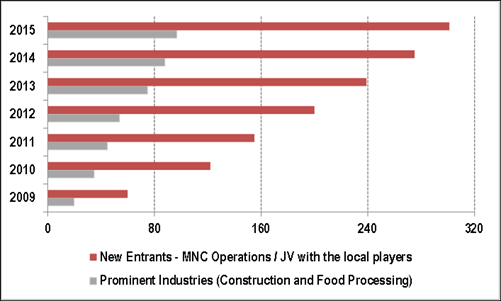Anuj Puri, Chairman & Country Head, JLL India
India 18 July 2016: Growing services sector, upcoming infrastructure investments & increased global investor interest slot country favourably

Sri Lanka has made an entry in the 2016 edition of JLL’s Global Real Estate Transparency Index (GRETI), which tracks which countries provide the most favourable operating environments for investors, developers and corporate occupiers. Compared to similar market sized countries like Myanmar (ranked at 95) and Vietnam (ranked at 68), Sri Lanka (ranked at 69) is a stronger debutant, and better-placed to move up in GRETI’s next (2018) assessment given the reforms being rolled out by the government and increasing interest of international investors in this market.
Sri Lanka and Vietnam are likely to compete for moving into the semi-transparent category – ahead of others in the pack – from their low-transparency status today. Both countries are reforming several sectors and attracting international investors. Myanmar too is off the block, and one of the fastest improvers, but has a long journey ahead through the cluster of countries with opaque real estate sectors.
Sri Lanka is currently in the midst of a promising period of rapid economic growth and social development, driven largely by investments into infrastructure across the country as well as continued growth in the services sector, which now contributes 58% of the country’s GDP. Revival signs in the economy can be seen from the promising GDP growth expected in the next few years.
According to the Asian Development Bank, the GDP growth rate is forecast to reach 5.3% in 2016 from 4.8% in 2015. Moreover, World Bank recently listed Sri Lanka at 107 (out of 189 countries) in terms of ‘ease of doing business’, as opposed to its 2015 listing at 113. Policy changes proposed in the Budget 2015-16 are expected to positively influence private and foreign investments.
Political stability coupled with a business-friendly environment facilitated by the current government has helped restore investors’ confidence. The country is now focused on long-term strategic and policy development changes to ensure long-term economic growth.
The government’s infrastructure push has led to an expansion of the construction industry over the past few years. Expansion and modernisation of Colombo’s port as also the development of other ports along with an improvement in the country’s road network has helped the logistics industry.
Moreover, domestic companies have showed stable growth and the number of foreign companies entering the island has seen a surge compared to 2009-10. Among the multinationals entering Sri Lanka, players in the food processing (see graph) and IT sectors too have shown interest in opening up offices, which bodes well for the economy.
The government’s plans of turning Sri Lanka into the most competitive economy in South Asia is expected to result in an incremental demand for office space from BPOs, financial, accounting and outsourcing companies.
Foreign operations / joint-ventures that have entered Sri Lanka (cumulative numbers)
Source: BOI Sri Lanka 2009-2015 statistics

According to the Travel and Tourism Index 2015, Sri Lanka’s travel and tourism competitiveness jumped 18 ranks over the past four years, driven by the strong government focus on the tourism sector, remarkable infrastructure growth as well as enhanced marketing and promotional efforts for the country as a whole. This sector is expected to grow further with the new budget of 2016 proposing promotion of the MICE (meeting, incentives, conferencing and exhibition) sector.
Outlook
Sri Lanka’s office and retail markets are seeing activity by reputed global names. This activity is reflecting through the growth in office and retail space off-take in last four quarters. With limitations of quality space available, the CBD sub-market rents have increased by 7-10% y-o-y in almost all grade-A office buildings.
Respected establishments like HSBC, Standard Chartered, Pearson Group, IDP Education, Firstsource, GSK, Red Cross, Uber, VFS (visa services), Zebra Technologies, Keangnam, among others, have already set up their base in Sri Lanka. Information technology leaders like IBM, Microsoft, and Cisco already have a base here. Renowned retail brands like The Body Shop, Tommy Hilfiger, Lacoste and others, are doing business in Sri Lanka largely through the franchisee route and more brands of the same league are actively studying this market. H&M is already active for buying and sourcing.
Diverse base of international companies is evident by established fast moving consumer goods giants like Johnson & Johnson, Nestle, and Unilever; service sector leaders like JLL, Tata Group, AIA, Allianz, and industrial- technology- logistics companies like Siemens, Ericsson and Maersk among others along with the best hospitality brands of ITC, Taj, Hyatt, Hilton, Shangri-La and Marriot.
Sri Lanka’s concern could be boosting foreign direct investment (FDI) quickly, maintaining a sustainable growth of the private sector and exports as well as addressing the urgent need to realign public spending with the nation’s immediate needs. The change of government has brought expectations of more transparency and more efficient utilisation of resources.
It is crucial now that the government implements necessary reforms to provide an improved investment climate conducive to driving more FDI and ushering in growth of the private sector – with a structured framework to drive investment.
